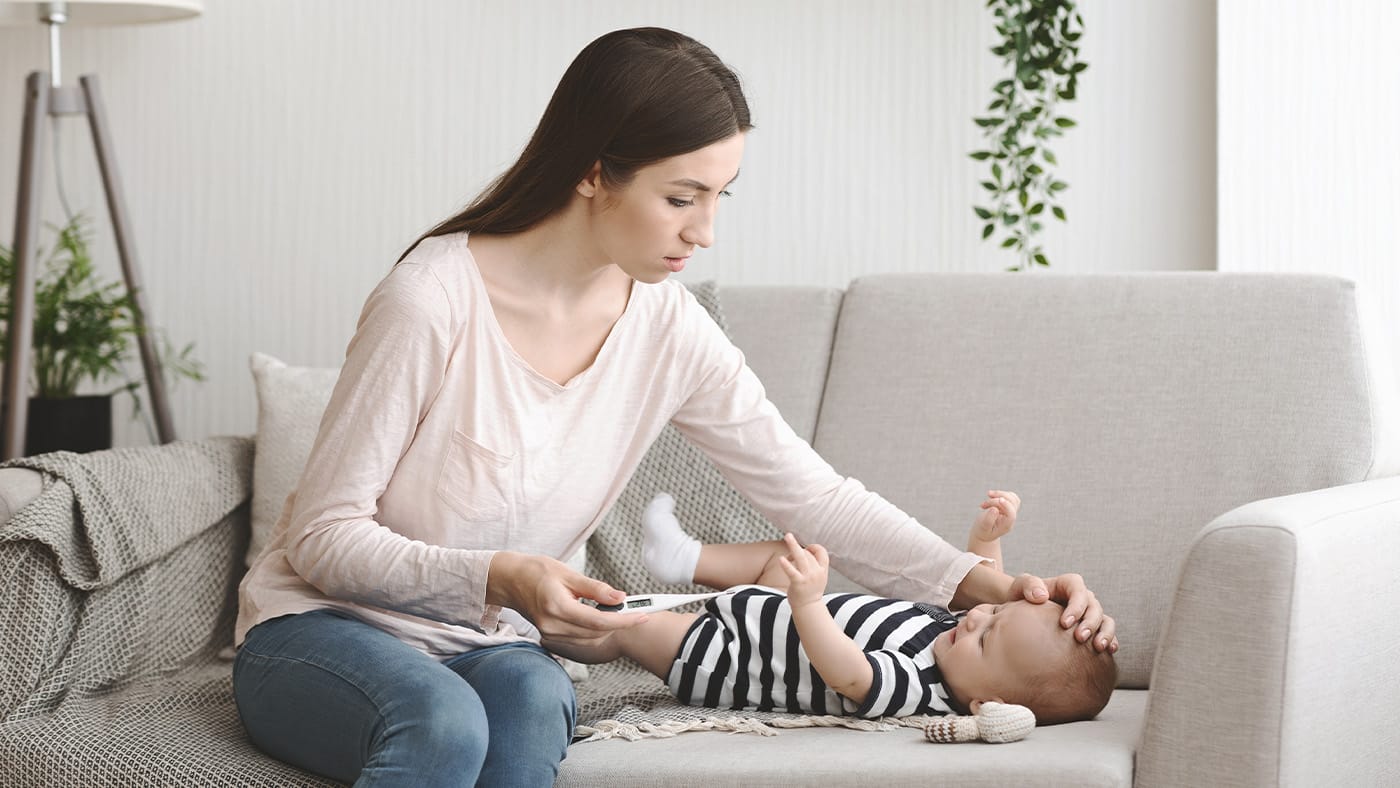Having a sick baby can be scary! It’s not uncommon for parents to worry at the first sign of fever or other illness. You just want to know what’s wrong, how to help them feel better, and when it might be something serious. You’re not alone in that. So, let’s walk through what a fever means, what to watch for, and how to care for your baby with confidence
Fevers are the body’s way of fighting off illness by raising the temperature to kill off an infection, but they make little ones miserable in the meantime. Fevers for infants are more common than fevers for adults, because their immune systems are still developing, building up defenses for all of the germs they’ll encounter throughout their lives. A high newborn temperature is a common symptom of many infections and illnesses. Common causes include colds and flu, ear infections, stomach viruses, and urinary tract infections. Most of the time, a fever will subside all on its own, but here’s how to know when to call the pediatrician and get reinforcements.
What is a newborn’s normal temperature?
Many parents think that anything above 98.6 is a fever, but that isn’t true. Remember that 98.6 is just the average human body temperature across demographics. For babies, a normal infant body temp range is typically between 97°F and 100.3°F. Additionally, body temperature fluctuates naturally throughout the day. It’s usually a little lower in the morning and rises later in the day. Anytime you take your baby’s temperature (rectal temp is best), a little bit of wiggle room should be expected, and anything under 100°F is considered a normal infant body temperature.
More important than the number on the thermometer is how your baby is behaving. Are they sluggish? Are they awake and active? Are they crying, and they won’t stop? Most importantly, are they behaving differently than they normally do? If your baby has additional symptoms of illness on top of a fever, that might warrant immediate attention. Look out for warning signs like missing meals or eating poorly. Infants already sleep a lot, but look for changes in their sleeping behavior. Are they sleepier than usual? Are they having extra trouble getting to sleep and staying asleep? Are they extra fussy, or do they seem lethargic?
If your baby has a fever but is otherwise behaving normally, there’s probably no cause for concern. Just monitor them because a fever can sometimes be an early sign of additional delayed symptoms.
How high is too high a fever for a baby?
Most of the time, a fever for an infant is a sign that your baby’s body is doing exactly what it’s supposed to be doing. Your baby’s immune system is working to fight off an infection and build up defenses to protect them in the future. In most cases, you don’t need to do anything except give your baby some extra cuddles and wait for the illness to run its course. Medication is usually only needed if your child is in pain. Here are some age-appropriate guidelines to follow:
0 to 3 Months: Before your baby is three months old, a rectal temperature of 100.4°F (38°C) or higher is considered a fever that requires immediate medical attention. At that age, your baby’s immune system is immature, and infections are potentially serious. When in doubt, contact your pediatrician.
3 to 6 Months: A rectal temperature over 100.4°F is considered a fever, but you should call the pediatrician if your child has a fever over 102°F or if your child has a fever with other symptoms of illness. As a reminder, guidelines are based on newborn rectal temp with an appropriate rectal thermometer. Ear temperature readings aren’t accurate before six months. Under-the-armpit measurements may read a couple of degrees lower. If your child has an armpit temperature 99 or higher, call the doctor.
6 to 24 Months: Call the pediatrician for any fever over 102°F that lasts for more than 24 hours, for any temperature over 100.4°F that lasts for more than three days, or if your child has any of the following symptoms:
- Unalert after taking fever medication such as acetaminophen or Ibuprofen
- Intermittent fevers (symptoms go away and come back) for a week or more
- Signs of dehydration, which include no tears while crying, hasn’t had any wet diapers, or hasn’t urinated in the last eight hours, dry mouth, dry tongue, or sunken eyelids
- Sore throat or earache
- Cough
- Diarrhea, nausea, or vomiting
Serious symptoms need immediate medical attention. Go to an emergency department or call 911 immediately if your child has a fever along with:
- A stiff neck
- Rash
- Difficulty breathing
- Can’t stop crying, even while being soothed
- Difficulty swallowing or excessive drooling
- Pain or tenderness in the abdomen
- Blue lips, tongue, or nails
- Trouble walking (if age appropriate)
- Altered speech (if age appropriate)
Use your judgement. If your child has other symptoms and is feeling crummy, don’t hesitate to call.
How to Break a Newborn’s Fever
Almost all fevers are caused by an infection, and viruses are the most common culprit. Your infant may get a fever in response to the flu, cold, or other respiratory viruses. A fever may also be caused by ear infections, kidney infections, sore throats, and other illnesses. In almost every case, the best thing you can do is make your child comfortable and help them rest while their immune system does its job.
- Hydrate!: Make sure your infant drinks plenty of fluids. Depending on their age, that might mean giving them breast milk or a bottle of formula. If your infant is a little older, you can offer an electrolyte drink to help replace fluids and nutrients, especially if they have vomiting or diarrhea. Hydration is the most important thing, so if your little one will only accept juice or some other drink (even those with sugar), that’s okay.
- Keep it light: Dress your infant in a single layer of clothing and use a lightweight blanket at bedtime. Your child may complain of being too cold, but wrapping them up too tightly or in too many layers can make it harder for their body to release heat. Keep their clothing airy so the fever can work itself out.
- Lukewarm bath: Giving your baby a lukewarm (not cold) bath can help lower their temperature. Even a cool washcloth or sponge bath can help.
- Pain management: Over-the-counter pain medications, such as acetaminophen and ibuprofen, can help reduce your child’s temperature and ease their discomfort. Make sure to check your child’s weight and use weight-appropriate doses. Most of the time, pain medication isn’t necessary. Talk with your child’s pediatrician if you have any questions.




